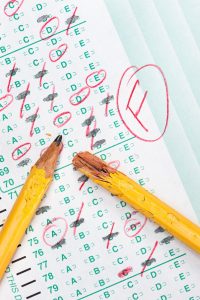Homer Simpson provides test prep advice you should not follow!
Depending on how familiar you are with the Simpsons oeuvre, you might remember an episode where Mr. Burns decides that he needs a male heir in order to pass on his fortune. Naturally, Homer encourages Bart to audition for the part of Burns’ heir. Bart, relying on Homer’s inept guidance, bungles the audition and misses out on the chance to inherit the fortune. As the Simpson family walks out afterwards, Homer passes on some fatherly advice: “Kids, you tried your best, and you failed miserably. The lesson is, never try.”
Of course, no one is looking to Homer Simpson for test prep advice. But the reality is that many students fall into the “Homer mindset”: I really tried my best on that homework/practice test/actual test and didn’t do well, so game over. I’m never going to do better on the SAT!
Where does failure occur during the process of test preparation? It can happen during a tutoring session – no matter how the tutor tries to explain that tricky algebra concept, the student just doesn’t get it. It can happen on a homework assignment – the student understood the reading comprehension strategy during the tutoring session, but can’t focus and complete the reading section at home. It can happen on a practice test – time runs out and the student only got through half of the math section.
And of course, failure can happen on the big kahuna – the actual test. Anxiety got the best of her; he forgot how subject-verb agreement works; her calculator batteries died during the math section. You try your best and just don’t get the score you want.
So what do you do when you’re confronted with failure during test prep? You see failure correctly for what it is: a learning opportunity.
Many students are practically allergic to making mistakes in front of their tutors, preferring instead to maintain the illusion of perfection. This attitude is typical of the “fixed mindset”. Carol Dweck, the pioneer of mindset thinking, defines the fixed mindset as one in which “students believe their basic abilities, their intelligence, their talents, are just fixed traits. They have a certain amount and that’s that, and then their goal becomes to look smart all the time and never look dumb.”
Here at AJ Tutoring, we do everything in our power to break down the fixed mindset in our students. The fixed mindset is the enemy of true learning and improvement on the SAT or ACT. The fixed mindset denies students the chance to take risks, learn from mistakes, and experience the satisfaction that comes from working hard and mastering a skill. In the end, you will only improve your SAT score if you’re willing to get questions wrong and then figure out how to get them right.
Theorizing about failure in a blog post is one thing, but what do we tell our students when they fail? How do we reconceptualize failure so our students can see it as a good thing? Let’s revisit the “failure points” during test preparation.
Failure to understand a concept during the tutoring session.
When a student has a hard time understanding a concept during a tutoring session, it usually comes down to one of two things: either they’re weak on fundamentals, or they’re terrified of “looking dumb” in front of their tutor. If the student is weak on fundamentals ( for example, they can’t solve a system of equations because they don’t know how to solve one equation for one variable), the tutor can usually diagnose this issue quickly. The sooner a student “fails” on a problem, the easier it is for their tutor to figure out the true issue and backtrack to the more elementary concept. And if the student doesn’t want to miss a problem and look dumb, this too is helpful information. It tells the tutor something about the student’s mindset towards failure and allows the tutor to take appropriate steps to change that mindset.

Failure on a homework assignment.
Sometimes a student understands a concept during the tutoring lesson, but can’t execute on the homework assignment. Failure on a homework assignment tells us something important too – either the student didn’t understand the concept as well as we thought they did (in which case, time to review), the student rushed through the assignment, or the student didn’t apply the correct strategies on the assignment. In all of these cases, failure tells us more about the student’s approach to SAT prep when he’s on his own. All of these problems are correctable given enough time.
Failure on a practice test.
Students (and parents) often expect great improvement on practice tests. Sometimes students get a solid score improvement on a practice test, and sometimes they don’t. As part of AJ Tutoring’s SAT and ACT prep process, we ask students to take at least 3 practice tests, and then we review those results with students in their next tutoring session. Reviewing practice tests with students is instructive – it allows us to see exactly what happened if a student “failed”. I had a frustrating situation with an ACT student last year whose practice test scores kept going down, even though he was doing great in our sessions. After the third declining practice test score, he and I sat down for a serious discussion. It turned out that the student was staying up late and then had a hectic morning of driving his siblings around before coming to our office for his test. By having that discussion during his prep, we made sure that he didn’t repeat the same pattern on test day. Sure enough, he got sleep the night before the actual test, and his ACT score went up by 5 points!
Failure on the actual test.
This is the scenario that strikes fear into the hearts of students and parents everywhere. How is it possible to turn a test day failure into a net positive? For starters, almost all students take the SAT and ACT more than once. It’s rare that students get the score they’re looking for on the first try. Every time you take the test, even if you don’t achieve your goal score, you get a little more test-taking experience and you learn more about how you operate on test day. And once you get your scores back, you know which sections and concepts you need to review for future tests.
Do you see the common thread here? Failure gives us more information. Rather than seeing failure as a reflection of your intelligence, try to see failure as a diagnostic tool that helps you do better on the next homework assignment or test.
Paul Tough’s book How Children Succeed is a worthwhile read on the factors that influence success in school. Chapter 3 looks at the unorthodox teaching methods of a middle school chess teacher in Brooklyn, Elizabeth Spiegel, who is able to lead her team to unexpected success. Spiegel’s teaching method is so unusual because she focuses on her students’ failures, analyzing wrong moves and bad games with the class until they deeply understand the right moves.
“Spiegel tries to lead her students down a narrow and difficult path: to have them take responsibility for their mistakes and learn from them without obsessing over them or beating themselves up for them.”
– How Children Succeed
When interviewed for the book, Spiegel noted, “It’s uncomfortable to focus so intensely on what you’re bad at…If you really want to get better at chess, you have to look at your games and figure out what you’re doing wrong.”
The same thing is true in test prep – if you really want a higher score on the SAT or ACT, you have to confront your failures head-on and figure out what you’re doing wrong. For the student who is brave enough to do this, the rewards are many – a higher test score, yes, but also the confidence to take risks, to sometimes fail, and to learn from that failure and do better the next time.
[Note: Many adults have a hard time with failure, let alone high school students. Failing well is a learned skill! Our SAT and ACT tutors are happy to help guide your student toward testing success. Please reach out to us for more information!]

